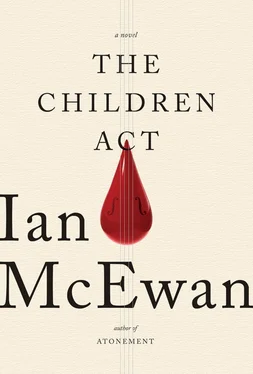But on the chaise longue it rose before her, the true extent of the insult, how he was prepared to pay for his pleasures with her misery. Ruthless. She had seen him single-minded at the expense of others, most often in a good cause. This was new. What had changed? He had stood erect, feet well apart as he poured his single malt, the fingers of his free hand moving to a tune in his head, some shared song perhaps, not shared with her. Hurting her and not caring—that was new. He had always been kind, loyal and kind, and kindness, the Family Division daily proved, was the essential human ingredient. She had the power to remove a child from an unkind parent and she sometimes did. But remove herself from an unkind husband? When she was weak and desolate? Where was her protective judge?
Self-pity in others embarrassed her, and she wouldn’t have it now. She was having a third drink instead. But she poured only a token measure, added much water and returned to her couch. Yes, it had been the kind of conversation of which she should have taken notes. Important to remember, to measure the insult carefully. When she threatened to end the marriage if he went ahead, he had simply repeated himself, told her again how he loved her, always would, that there was no other life but this, that his unmet sexual needs caused him great unhappiness, that there was this one chance and he wanted to take it with her knowledge and, so he hoped, her assent. He was speaking to her in the spirit of openness. He could have done it “behind her back.” Her thin, unforgiving back.
“Oh,” she murmured. “That’s decent of you, Jack.”
“Well, actually…” he said, and didn’t finish.
She guessed he was about to tell her the affair had already begun and she couldn’t bear to hear it. Didn’t need to. She saw it. A pretty statistician working on the diminishing probability of a man returning to an embittered wife. She saw a sunlit morning, an unfamiliar bathroom, and Jack, still decently muscled, pulling a half-unbuttoned clean white linen shirt over his head in that impatient way he had, a discarded shirt tossed toward the laundry basket hanging by one arm before sliding to the floor. Perdition. It would happen, with or without her consent.
“The answer’s no.” She had used a rising tone, like a flinty schoolmarm. She added, “What else would you expect me to say?”
She felt helpless and wanted the conversation to end. There was a judgment to approve before tomorrow for publication in the Family Law Reports . The fates of two Jewish schoolgirls had already been settled in the ruling she had delivered in court, but the prose needed to be smoothed, as did the respect owed to piety in order to be proof against an appeal. Outside, summer rain beat against the windows; distantly, from beyond Gray’s Inn Square, tires hissed on drenched asphalt. He would leave her and the world would go on.
His face had been tight as he shrugged and turned to leave the room. At the sight of his retreating back, she felt the same cold fear. She would have called after him but for the dread of being ignored. And what could she say? Hold me, kiss me, have the girl. She had listened to his footsteps down the hall, their bedroom door closing firmly, then silence settling over their flat, silence and the rain that hadn’t stopped in a month.
FIRST THE FACTS. Both parties were from the tight folds of the strictly observant Haredi community in north London. The Bernsteins’ marriage was arranged by their parents, with no expectation of dissent. Arranged, not forced, both parties, in rare accord, insisted. Thirteen years on, all agreed, mediator, social worker and judge included, that here was a marriage beyond repair. The couple were now separated. Between them they managed with difficulty the care of the two children, Rachel and Nora, who lived with the mother and had extensive contact with the father. Marriage breakdown had started in the early years. After the difficult birth of the second girl, the mother was unable to conceive again, due to radical surgery. The father had set his heart on a large family and thus began the painful unraveling. After a period of depression (prolonged, said the father; brief, said the mother), she studied at the Open University, gained a good qualification and entered on a career in teaching at primary level once the younger had started school. This arrangement did not suit the father or the many relatives. Within the Haredim, whose traditions were unbroken for centuries, women were expected to raise children, the more the better, and look after the home. A university degree and a job were highly unusual. A senior figure of good standing in the community was called as a witness by the father and said as much.
Men did not receive much education either. From their mid-teens, they were expected to give most of their time to studying the Torah. Generally, they did not go to university. Partly for this reason, many Haredim were of modest means. But not the Bernsteins, though they would be when their lawyers’ bills were settled. A grandparent with a share in a patent for an olive-pitting machine had settled money on the couple jointly. They expected to spend everything they had on their respective silks, both women well known to the judge. On the surface, the dispute concerned Rachel and Nora’s schooling. However, at stake was the entire context of the girls’ growing up. It was a fight for their souls.
Haredi boys and girls were educated separately to preserve their purity. Modish clothes, television and the Internet were forbidden, and so was mixing with children who were allowed such distractions. Homes that did not observe strict kosher rules were out of bounds. Every aspect of daily existence was well covered by established customs. The problem had started with the mother, who was breaking with the community, though not with Judaism. Against the father’s objections, she was already sending the girls to a coeducational Jewish secondary school where television, pop music, the Internet and mixing with non-Jewish children were permitted. She wanted her girls to stay on at school past the age of sixteen and to go to university if they wished. In her written evidence she said she wanted her daughters to know more about how others lived, to be socially tolerant, to have the career opportunities she never had, and as adults to be economically self-sufficient, with the chance of meeting the sort of husband with professional skills who could help to support a family. Unlike her husband, who gave all his time to studying, and teaching the Torah eight hours a week without pay.
For all the reasonableness of her case, Judith Bernstein—angular pale face, uncovered frizzy ginger hair fastened with a huge blue clasp—was not an easy presence in court. A constant passing forward with freckly agitated fingers of notes to her counsel, much muted sighing, eye-rolling and lip-pursing whenever her husband’s counsel spoke, inappropriate rummaging and jiggling in an outsized camel leather handbag, removing from it at one low point in a long afternoon a pack of cigarettes and a lighter—provocative items in her husband’s scheme, surely—and lining them up side by side, on hand for when the court rose. Fiona saw all this from her advantage of height but pretended not to.
Mr. Bernstein’s written evidence was intended to persuade the judge that his wife was a selfish woman with “anger-management problems” (in the Family Division, a common, often mutual charge) who had turned her back on her marriage vows, argued with his parents and her community, cutting the girls off from both. On the contrary, Judith said from the stand, it was her parents-in-law who would not see her or the children until they had returned to the proper way of life, disowned the modern world, including social media, and until she kept a home that was kosher by their terms.
Читать дальше












